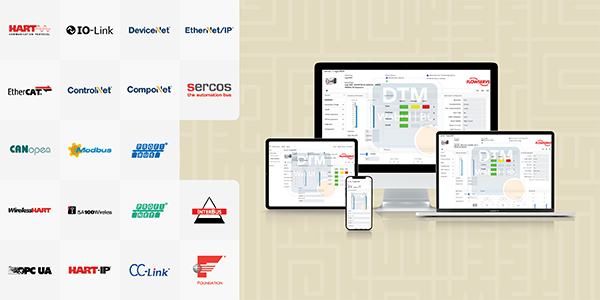
This editorial delves into the imperative of adopting a unified, device-independent configuration approach using FDT/DTM (IEC 62453) technology, revolutionizing control systems across diverse process and factory applications to answer the industry’s call to provide standardized intelligent device management, as revealed in FDT Group’s latest survey finding.
In the complex landscape of industrial control systems, where a vast array of devices spans from Variable Frequency Drives (VFDs) and process instruments to valves, actuators, and intelligent sensors, the heterogeneity of these devices introduces a challenge. Each device may adhere to different configuration networked standards, such as Profibus, EtherNet/IP-CIP, Modbus, HART, Foundation Fieldbus, etc., depending on the application requirements. This scenario often forces engineers and operators to use fragmented device configuration tools dependent on the protocol, causing numerous inefficiencies in workflow, training needs, and data access limitations that are costly to the bottom line.
Match this industrial device management challenge with the industry making progress in defining and launching a digital transformation strategy, and you’ll find gridlock. The current state of control system silos brings inconsistencies that prevent intelligent data from easily being consolidated for collaborative applications such as IT/OT data servers and higher-level applications for predictive maintenance and analytics for intelligent manufacturing AI, ML, etc.
Device configuration unification can no longer be an afterthought in the makeup of control applications. Furthermore, individual communication protocol standards should not define the device configuration standard.

By adopting FDT/DTM as your device- and network-independent configuration environment at the core of your control system application, open interoperability is achieved. The FDT Unified Environment provides the collaborative method allowing all protocols and devices to plug and produce, allowing operators open access to all device parameters, features, and functions for a standardized approach to intelligent device management (device configuration, commissioning, operation, and maintenance) within a control system.
The FDT/DTM (IEC 62453) standard is a beacon of unity amidst diversity. FDT technology pioneers a device-independent configuration approach, breaking away from the restraints of individual device configuration standards. As industries embrace the FDT standard, they embark on a journey toward a future where control systems are unified and adaptable, allowing for optimizing devices based on specific needs and preferences. The FDT standard is more than a technological advancement; it is a gateway to a new era of efficiency, flexibility, and innovation in control systems.
It’s easy to get started with FDT/DTM technology today. FDT Group offers host and device developer tools, reducing time to market with solutions that meet FDT specification conformance. It allows vendors to focus on value-added features and functions that separate their offerings from competitors. FDT Service providers can assist the vendor community by offering strategy consulting and turn-key development services.